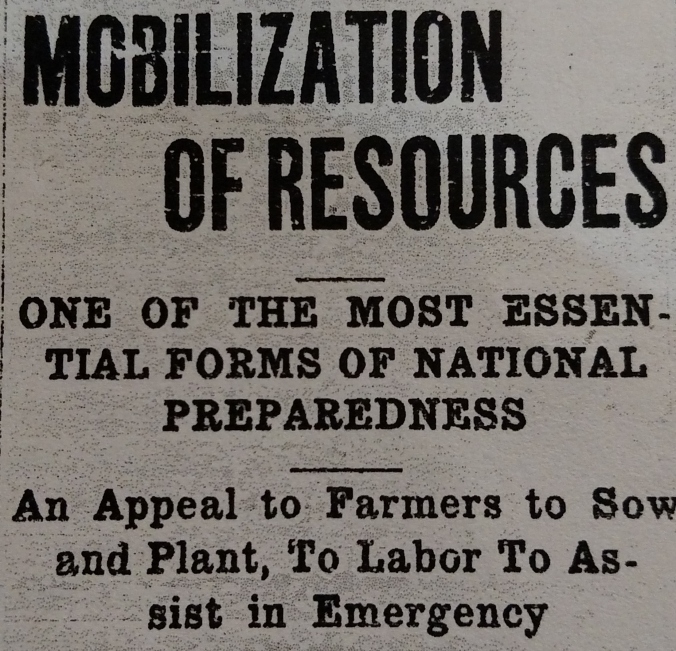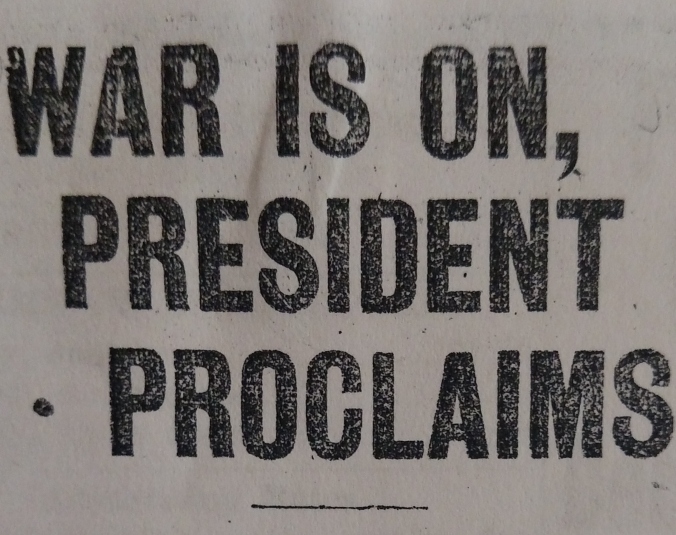
Above: The Gratiot County Herald, April 12, 1917
The news that the United States had officially joined the Great War in April, 1917 brought about a surge of patriotism in Gratiot County.
Down in Middleton, high school students showed their patriotism by wearing small flags on their clothes. They sang patriotic songs in the afternoon when the Declaration of War was announced. The American flag waved over the building as it also did over numerous downtown businesses.
Gratiot County hoped that at least one hundred young men would initially join up to fight before April ended. The nation had a goal of supplying 38,000 men for the navy by the end of the first week alone. Volunteers between the ages of sixteen and forty were asked to apply (those under eighteen needed their parents permission). These first volunteers only had to be able to understand English – reading and writing was not required. Some of the departments that were immediately open for recruits included the infantry, field artillery, coast artillery, medical department and signal corps. As another incentive to sign up, the government pledged that those who volunteered would be released from service as soon as the war ended.
Volunteering was an expectation of men as Gratiot County went to war. True patriots were expected to willing offer their service to the country. Only “slackers” dodged the service (a term that would be used in Gratiot County as the summer and fall of 1917 went on). It was initially believed by county newspapers that if enough men volunteered then there would be no immediate need for a draft. Although conscription seemed to be inevitable, a draft was the last resort. Right now, in April, 1917, true patriots in Gratiot County would step up and defend the nation by volunteering.
Ordinary citizens were quickly told by the government about what they could do for the war effort. Foremost was an immediate concern about the winter wheat crop in Gratiot County. Because a national food shortage was being envisioned by President Woodrow Wilson, farmers were encouraged to plant spring wheat and to prepare for other crops for the upcoming season. One of the biggest calls for boys too young to volunteer for the war was to make themselves available to help on area farms. Wilson coined these boys “Soldiers of the Commissary” and he urged youngsters to volunteer for this farm labor. For these young boys, Gratiot County’s farms would be the battlefield that they could serve on.
Still, sacrifices would have to be made by all those living in Gratiot County. Another item quickly became Liberty Gardens, individual gardens grown by everyone to help supplement their own food for 1917. These included growing potatoes, beans and onions, among other foods. A League for Woman’s Service was organized the same month in the county. Although details were unclear as to what women would be expected to do, groups formed to foster patriotism and to cooperate with the Red Cross. It’s slogan became “For God, For Country, For Home.”
Over in Ithaca, prominent men were asked to raise money to help foster Belgian babies. Judge Kelly Searl spearheaded a drive to raise money to contribute one dollar a month to provide food for Belgian babies who had been orphaned or left destitute due to the war conditions in Belgium. On his first meeting at the Ithaca Methodist Sunday School in late April, Judge Searl obtained pledges for $20.50 a month to help these children.
Yes, things were off and moving as Gratiot County started its trek through the Great War.
Copyright 2017 James M. Goodspeed




